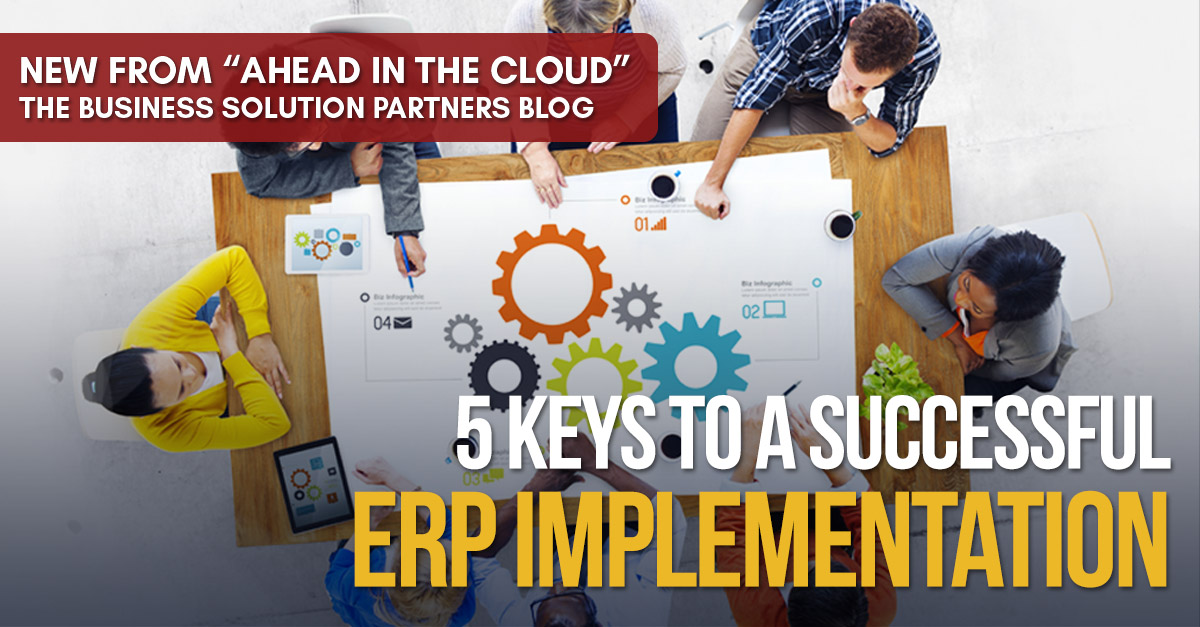5 Keys to a Successful ERP Implementation
As your organization grows, so does your need for more advanced systems. At some point in every organization’s growth, a change to a new Enterprise...
 Most firms, especially small and midsized companies, have a goal of growing their business. At some point in this growth you will need to implement an Enterprise Resource Planning (ERP) system. An ERP implementation can be an overwhelming project for those firms that are not prepared for it. It is precisely these firms that are at risk of experiencing an unsuccessful project. If you want to be prepared, consider the following steps.
Most firms, especially small and midsized companies, have a goal of growing their business. At some point in this growth you will need to implement an Enterprise Resource Planning (ERP) system. An ERP implementation can be an overwhelming project for those firms that are not prepared for it. It is precisely these firms that are at risk of experiencing an unsuccessful project. If you want to be prepared, consider the following steps.
Create a Strong Project Team
Lining up the right resources will make the difference between a successful project and a failed one. Select people that you know can deliver. They should have a positive attitude about the project and should have expertise in their business area. As line of business experts they will be able to contribute knowledge of policies and procedures and will understand the right questions to ask.
The project leader should be someone who has the ability to manage projects and people. They should also have the ear of management and be able to drive decisions that change procedure. Without a strong project leader the project can stall when critical decisions are waiting to be made.
Review Current Business Processes
Having a deep understanding of your business provides the starting point for an ERP implementation. Start with defining or reviewing the company vision. This includes the vision of the ERP software initiative. Why are you implementing ERP and does it support the company vision and goals? All projects, especially an ERP implementation, must support the company vision and goals or it will not receive the support that it needs from management.
Identify the business processes that will be impacted by the ERP system and perform a detailed review of each of these processes. If possible, document them as well. Many firms won’t have the time or resources to do this documentation, but at a minimum summary documentation should be written.
During the review, interview the managers of each area and ask questions that will provide an understating of how the business operates. Ask questions like:
Identify and gather the forms, reports, and tools that support the business process. This includes the spreadsheets and databases of information that are used and or generated. Also find out what metrics and key performance indicators (KPI’s) are used to manage the business area. All of these will be needed during the ERP implementation so that you can provide the needed information and tools by the business line managers.
Plan Your ERP Implementation
Once the affected business areas have been reviewed it is time to start planning. You will have gathered many documents, reports, and spreadsheets. Review the gathered tools and forms and organize them into functional areas.
Be Organized! You will need to refer back to these documents on a regular basis and others will be requesting access to them. Understand your security limitations. Certain documents may be confidential and are limited to specific groups of personnel. Be prepared to protect this confidentiality.
Prioritize the areas that will get the most benefit from the ERP Implementation by looking for the areas that need the most improvement. These areas should be implemented first, if possible. Many times a phased approach to implementation is the best course of action. Determine how many areas can be reasonably implemented at the same time and plan to do only those at the same time.
Create a list of functional requirements that each area needs. The system should provide functionality to support these needs and you will need to refer back to them during the implementation.
One of the most important parts of the planning process is to create a project plan. You can use whatever tool makes sense for you, such as Microsoft Project or Excel. Plan out the phases of the project and then identify the tasks, resources, and timelines needed to accomplish your goal. This document will be the road map to a successful implementation.
Select a Professional Implementation Firm
If you are not experienced in managing projects or don’t have the time, then hire a professional consulting firm to assist or manage the project for you. Don’t go it alone. They can create the project plan discussed above or advise you on how to do it.
While not required, it is better to select a firm that is also an expert in the ERP solution you have selected. They will know the best way to quickly and efficiently implement the system and will be able to train you and your staff. An experienced consulting firm saves money and time and results in a better implementation since they can better fit the application to your business needs.
In Conclusion
Being prepared for your ERP implementation will result in a successful project and will save both time and money. The key ways to be prepared are to create a project team, review your current business processes, analyze the business processes and look for improvements, get organized, plan your implementation, and hire a professional implementation consulting firm.
If you need assistance with your ERP implementation give us a call at Business Solution Partners. Our staff has many years of experience implementing systems.

As your organization grows, so does your need for more advanced systems. At some point in every organization’s growth, a change to a new Enterprise...
Your company has decided to upgrade to a cloud-based enterprise resource planning system, or cloud ERP, and now you’re comparison-shopping. While...
Implementing customer relationship management (CRM) software can be a challenging process. But many wholesale distributors and manufacturers decide...